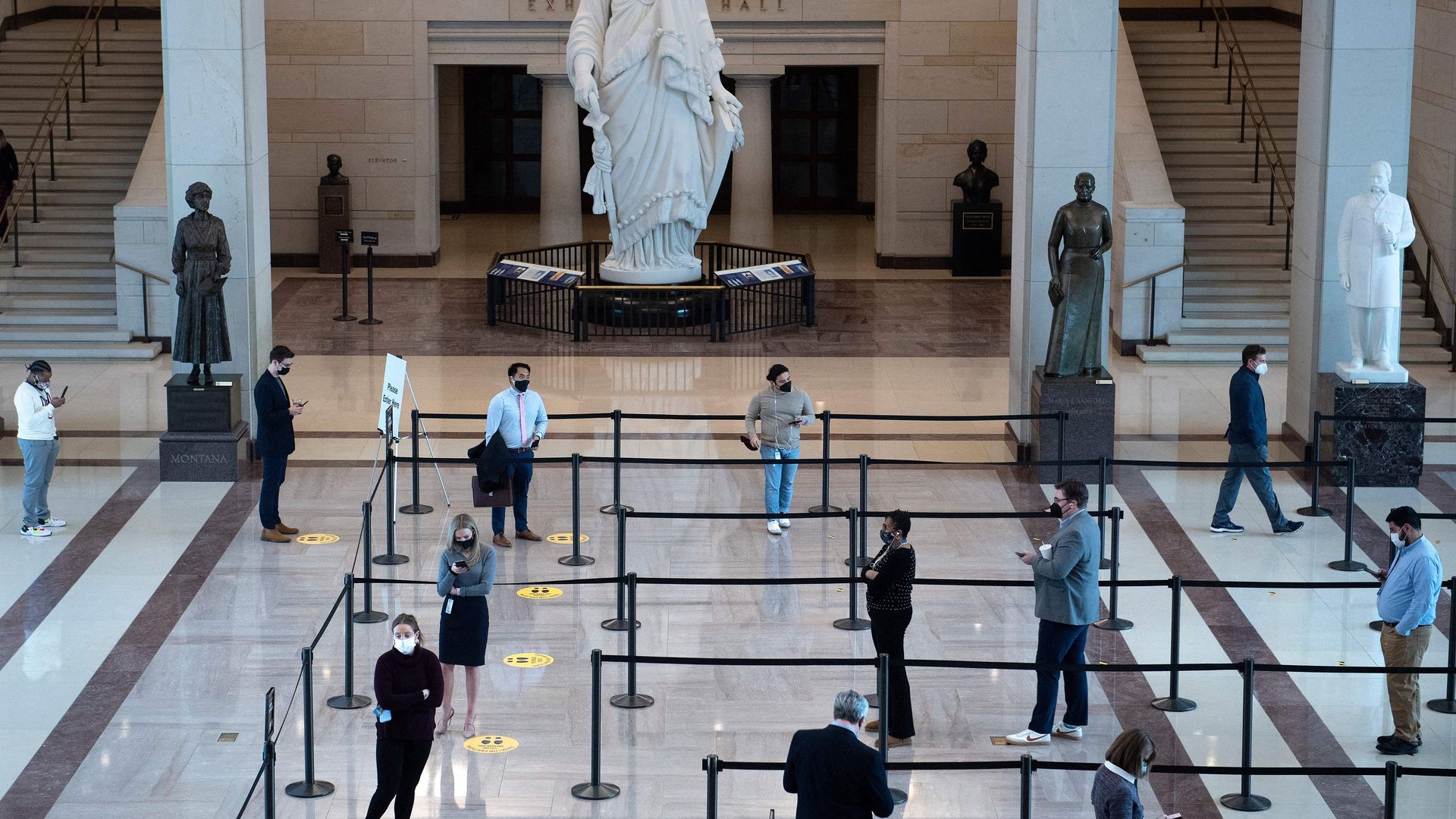Nearly 4 in 10 House members to vote remotely as Omicron surges
Add Axios as your preferred source to
see more of our stories on Google.

Congressional staffers, reporters and others queue up in the Capitol Visitors Center on Monday to await coronavirus tests. Photo: Brendan Smialowski/AFP via Getty Images
More than a third of House members are prepared to vote remotely this week — a reflection of the deep coronavirus fears coursing throughout the highest level of government, as well as the embrace of proxy voting for other reasons.
Why it matters: Proxy voting was enacted to allow representatives to reduce their risk of contracting the virus, but it has also undercut the convening of the People's House and allowed alternative political activity, including foreign trips and fundraising.
- Exacerbating the problem is the uneven application of COVID-19 reporting requirements and practices in Congress.
- There's no requirement for senators or representatives to declare their vaccination or COVID status, although Reps. Alexandria Ocasio-Cortez (D-N.Y.) and Nancy Mace (R-S.C.) have been among the most recent to announce positive results.
- House members are punished for refusing to wear a mask in their chamber, yet two Georgia Republicans have racked up more than $100,000 in combined fines in defiance of the rule.
Driving the news: Axios found that 158 lawmakers had active proxy voting letters on file with the Office of House Clerk before Monday’s night’s 6:30pm quorum call.
- Fifty-eight of those letters alone arrived during the day. They designated a colleague to cast a vote on another member's behalf.
- House Speaker Nancy Pelosi has extended the use of proxy voting until Feb. 13, and some lawmakers privately expect her to prolong it for another 45-day stretch.
- Over the weekend, ahead of members returning for the first time since early December, the House imposed new coronavirus precautions.
- The Capitol physician urged staff to wear KN95 masks and "adopt a maximal telework posture."
The big picture: The House established proxy voting in May 2020 to allow members to follow COVID protocols and avoid traveling during the height of the pandemic.
- While Republicans have been critical of the practice, with Minority Leader Kevin McCarthy petitioning the Supreme Court to declare it unconstitutional, members from both parties have used — and stretched — proxy voting during the past 19 months.
- In August, Reps. Seth Moulton (D-Mass.) and Peter Meijer (R-Mich.) slipped into Afghanistan on their own fact-finding mission but didn’t miss any roll call votes because they'd designated proxies back in Washington.
- AOC also once voted "present" — by proxy.
By the numbers: Lawmakers have made more than 3,300 proxy designation since the practice started, with some House members making dozens of requests and changing up the lawmakers who they entrust with their vote.
- In October, when the House was gaveled back into session from the Columbus Day recess to vote for a short-term debt ceiling extension, 160 lawmakers voted via in absentia.
- During the first year, the number of active proxies fluctuated, with the number of lawmakers who made short proxy requests increasing over time, according to the Brookings Institution.
How it works: Lawmakers file a boilerplate letter with the House Clerk to invoke the proxy rule. They cite the “ongoing public health emergency” and designate a colleague — typically from the same party — about how to vote on a given bill.
- Lawmakers are required to document the voting instructions he or she gives to their proxy.
Go deeper: Some Republicans who vigorously opposed the proxy voting on principle have used it in practice.
- Some used it to visit the border with former President Trump during the summer of 2020, while votes were being called in Congress.
- A handful of California lawmakers have voted by proxy more than 250 times since May 2020, with Rep. Grace Napolitano (D-Calif.), 85, citing her age and stroke history, to use it almost 400 times, the Los Angeles Times reported in August.
- Rep. Tom Malinowski (D-N.J.) availed himself of proxy voting on the debt ceiling because he was raising money in California, according to the New Jersey Globe.
